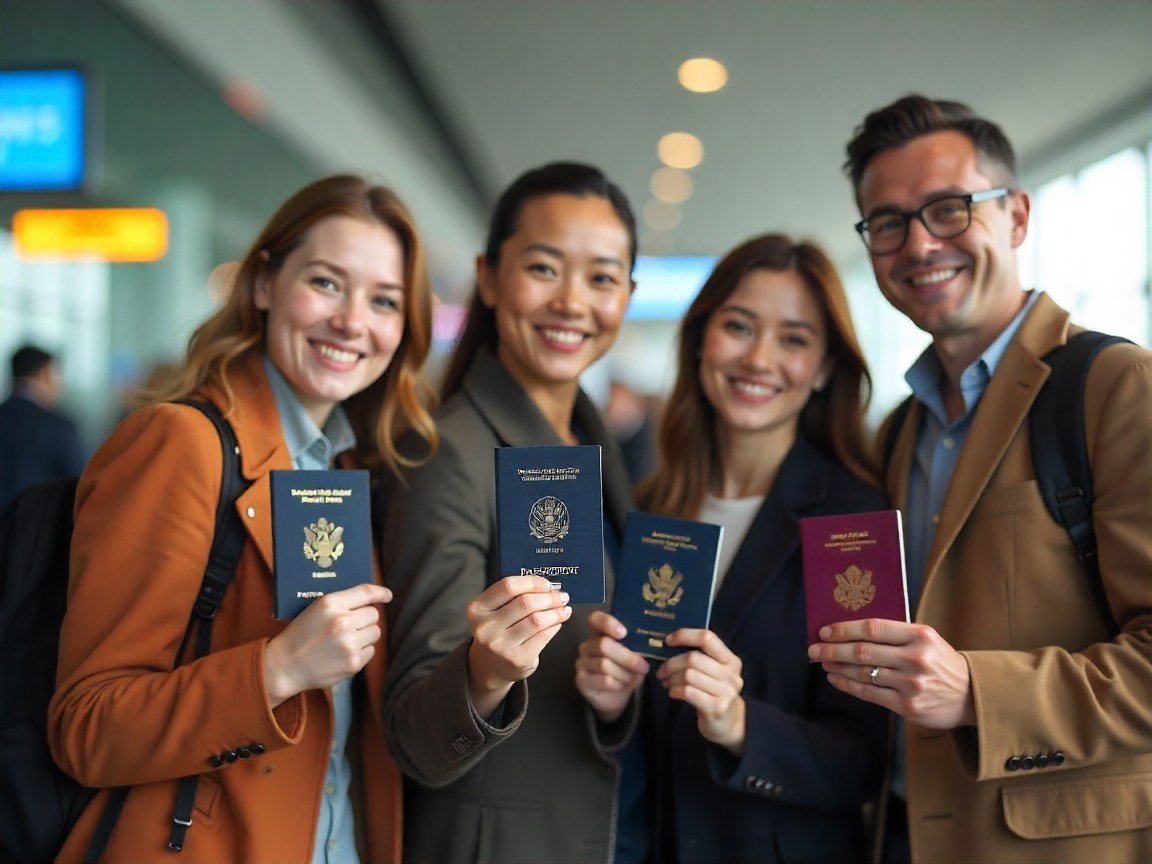Asia Travel Pulse
South Korea Joins Japan, Singapore, Thailand, Kazakhstan, And More In Asia As UK Issues New Travel Warning Over Heightened Risks

Wednesday, August 6, 2025
South Korea Joins Japan, Singapore, Thailand, Kazakhstan, and More as UK Issues New Travel Advisory due to escalating security risks, health concerns, and regional tensions that have raised alarms for British nationals. As the geopolitical landscape continues to shift, the UK Foreign, Commonwealth & Development Office (FCDO) has expanded its travel warnings to include several Asian nations, urging travelers to exercise caution and stay informed. These countries, once considered safe havens, are now experiencing increased instability, prompting the UK to update its travel advice to ensure the safety and well-being of its citizens abroad.
In response to escalating concerns regarding security, health risks, and other regional tensions, the UK Foreign, Commonwealth & Development Office (FCDO) has issued new travel advisories affecting several key destinations in Asia. Countries like South Korea, Japan, Singapore, Thailand, and Kazakhstan are now on the radar as the UK urges citizens to review updated travel guidelines before planning trips.
South Korea: Heightened Tensions and Regional Risks
South Korea, traditionally known for its strong international relations and modern infrastructure, has now become part of the UK’s new travel advisory list. This inclusion comes due to a variety of escalating security and health concerns in the region. With political tensions in neighboring areas, natural disasters, and health risks, South Korea has found itself increasingly involved in situations that require travelers to exercise heightened caution.
Entry Requirements and Passport Validity
For British nationals planning to visit South Korea, entry regulations are clear. Travelers are advised to ensure their passports are valid for at least 6 months from their planned arrival date. If you’re traveling for less than 90 days on a short-term visa, this will be a straightforward process. However, for those intending to stay longer or work in the country, additional documentation and visa applications are required.
Health and Safety Alerts
Health concerns, particularly with communicable diseases, have been highlighted by the FCDO. South Korea, despite its strong healthcare system, is facing challenges in managing public health due to regional outbreaks and ongoing threats. Travelers are encouraged to stay updated on local advisories related to health and disease prevention, especially if coming from countries with known health risks.
Japan: Rising Security Concerns and Regional Instability
Japan has long been considered a safe and reliable destination for travelers, but recent geopolitical developments have prompted the UK to issue an updated travel advisory. While Japan remains one of the safest countries in Asia, ongoing regional tensions have raised concerns about the safety of British nationals in the region.
Entry Requirements and Travel Insurance
To visit Japan, British nationals must ensure their passports are valid for at least 6 months upon arrival. The Japanese immigration authorities are strict about entry requirements, and failure to meet these standards could result in denied entry. Travelers should also ensure they have appropriate travel insurance, especially if engaging in high-risk activities such as hiking or exploring remote areas.
Safety and Security Risks
While Japan itself is not facing direct conflict, the heightened security risk comes from ongoing tensions with neighboring countries. The UK government has advised British nationals to stay informed of the political landscape and remain vigilant, especially in areas with frequent protests or demonstrations.
Singapore: Zero Tolerance for Drug Offenses and Strict Border Controls
Singapore, known for its strict laws and efficient immigration procedures, has been included in the UK’s travel advisory due to its firm stance on drug-related offenses and the enforcement of stringent entry regulations.
Entry Requirements and Passport Validity
As with other countries in the advisory, British nationals traveling to Singapore must ensure their passport has at least 6 months of validity from their planned arrival date. The Singaporean authorities enforce a zero-tolerance policy for drugs, and travelers caught with even trace amounts of illegal substances face severe consequences, including arrest and prosecution.
Travel Insurance and Risk Awareness
The UK government strongly encourages travelers to invest in comprehensive travel insurance. This insurance should cover emergency medical expenses, trip cancellations, and potential legal issues arising from inadvertent violations of Singapore’s strict drug laws.
Thailand: Political Tensions and Travel Restrictions
Thailand, a popular destination for tourists, especially for its beaches and vibrant city life, is also under scrutiny in the latest UK travel advisory. The country has been facing political instability in recent years, with protests and clashes affecting several areas.
Areas to Avoid: Safety First
The FCDO has advised against all but essential travel to specific provinces in southern Thailand, particularly those near the Thailand-Malaysia border. Areas such as Pattani, Yala, Narathiwat, and parts of Songkhla have been flagged due to ongoing conflicts, with insurgent activity reported along the border with Malaysia.
Additionally, the Thailand-Cambodia border has become a flashpoint, with military clashes in certain regions. British nationals are advised to avoid the area and exercise caution when traveling near the border.
Health and Safety Risks
Health risks, such as the spread of tropical diseases, also feature heavily in the advisory. Travelers should ensure they are vaccinated and take proper precautions against mosquito-borne illnesses like dengue fever and malaria.
Kazakhstan: Rising Concerns Over Drug Smuggling and Illegal Activities
Kazakhstan, a vast country located in Central Asia, has been flagged by the UK government due to the increasing risk of involvement in illegal activities, particularly drug smuggling. The country has seen an uptick in organized crime, and British nationals have occasionally been caught up in illegal drug-related incidents during transit.
Entry Requirements and Passport Validity
For those planning to travel to Kazakhstan, it is crucial to ensure that your passport remains valid for at least 6 months beyond your intended stay. Travelers should also be aware of the potential for bureaucratic hurdles and ensure they meet all entry requirements. Those planning to visit rural or remote areas are advised to take extra precautions, as infrastructure may not be as reliable as in major cities like Almaty or Nur-Sultan.
Drug-Related Issues
The UK government has explicitly warned travelers about the risks of being inadvertently involved in drug-related offenses. Kazakhstan has harsh penalties for drug offenses, including for possession of small amounts, and there have been cases where travelers have been detained during routine airport checks.
Additional Travel Advice: Key Tips for All Destinations
While each country has unique risks associated with it, there are common guidelines travelers should follow when considering trips to any of these nations:
- Travel Insurance: The FCDO stresses the importance of comprehensive travel insurance. Whether it’s covering emergency medical situations or unexpected cancellations, having proper coverage can significantly reduce the risk of financial loss in case of unforeseen events.
- Health and Safety: Stay updated on any local health advisories and take necessary vaccinations, especially when traveling to regions where tropical diseases are a concern.
- Local Laws and Regulations: Always familiarize yourself with local laws and customs, particularly regarding issues like drug use, alcohol consumption, and other legal restrictions that may differ from your home country.
- Security Measures: Always stay informed about local safety conditions, especially in areas prone to political unrest, natural disasters, or security threats.
Traveling abroad can be an enriching experience, but it’s essential to prioritize safety and preparation. With the UK’s latest travel advisories, British nationals are encouraged to carefully consider their travel plans to countries like South Korea, Japan, Singapore, Thailand, and Kazakhstan.
If you follow the tips set by Foreign, Commonwealth & Development Office such as getting proper travel insurance and researching the destination, then you can be sure of a relaxed and safe journey. Always check if you have your travel documents set and proper travel insurance so you will be covered in case of emergencies.
South Korea Joins Japan, Singapore, Thailand, Kazakhstan, and More as UK Issues New Travel Advisory due to growing security concerns, health risks, and escalating regional tensions. The UK Foreign, Commonwealth & Development Office (FCDO) has updated its guidance to help British nationals stay informed and safe while traveling in these areas.
Whether you are planning to go South Korea to explore the country’s modern districts, or even Japan to soak in their vibrant culture, I think so long as you are prepared, you will have an enjoyable trip.
Asia Travel Pulse
China, Malaysia, India, Russia, and South Korea Lead the Way as Bangkok Tops Global Travel Lists for Summer 2025

Thursday, August 7, 2025
Author: TTW News Desk
As summer 2025 draws near, Bangkok has once again emerged as one of the top global travel destinations, with travelers from China, Malaysia, India, Russia, and South Korea driving the surge in bookings. These countries are leading the charge due to a combination of factors: Bangkok’s rich cultural heritage, modern amenities, and exceptional hospitality, which continue to attract visitors seeking both authentic experiences and luxury. The Thai capital’s appeal lies in its unique ability to blend vibrant street culture with world-class shopping, historic landmarks, and sustainability-focused tourism practices. As Bangkok secures its position at the top of global travel lists, the influx of tourists from these regions underscores the city’s enduring popularity despite global challenges.
A City That Blends Tradition and Modernity
Bangkok’s lasting popularity is a testament to its ability to blend its rich cultural heritage with modern conveniences. From ancient temples and palaces to cutting-edge shopping malls and vibrant nightlife, the city offers a diverse array of experiences that appeal to a wide range of travelers. Visitors come for the authentic street food culture, bustling markets, and iconic landmarks like the Grand Palace and Wat Pho, while also enjoying world-class hotels, restaurants, and shopping destinations.
In addition to its cultural draw, Bangkok is known for its high standards of service and international safety protocols, ensuring that travelers from all over the world can experience the city with confidence. This combination of heritage, modernity, and hospitality makes Bangkok a unique and enduring favorite for global travelers.
Experiential and Sustainable Travel Trends
The growing demand for experiential travel is a key factor behind Bangkok’s continued success. Travelers are increasingly seeking destinations that offer more than just sightseeing—they are looking for deeper cultural connections and opportunities to engage with local traditions. Bangkok excels in this regard, offering visitors the chance to immerse themselves in the city’s history and culture while still enjoying the convenience and luxury of modern amenities.
Moreover, Bangkok has positioned itself as a sustainable travel destination, promoting responsible tourism practices. Efforts to protect the city’s natural and cultural resources are part of a broader push by the Thai government to ensure that tourism growth does not come at the expense of the environment or local communities. This focus on sustainability has resonated with travelers who are more conscious about their environmental impact.
Tourism Trends Reflect Bangkok’s Enduring Popularity
Thailand’s tourism statistics further highlight Bangkok’s status as a top global destination. From January 1 to August 3, 2025, the country welcomed over 19.6 million international visitors, with Bangkok continuing to be the most popular entry point. The top countries sending tourists to Thailand this year include:
China: 2,733,160 visitors
Malaysia: 2,700,103 visitors
India: 1,390,693 visitors
Russia: 1,124,467 visitors
South Korea: 918,372 visitors
China’s return to the top spot reflects a rebound in outbound travel from the region, following the lifting of pandemic restrictions. This resurgence in Chinese tourists is significant for Thailand, which has long been a favored destination for travelers from China. The steady influx of visitors from other regions, including Malaysia, India, and South Korea, further demonstrates Bangkok’s widespread appeal across Asia and beyond.
Promoting Thailand as a Global Tourism Leader
The Thai government continues to play a key role in maintaining Bangkok’s status as a leading global tourism destination. A focus on promoting sustainable tourism, preserving cultural heritage, and supporting local businesses is central to the country’s tourism strategy. Through initiatives that prioritize responsible tourism and environmental protection, Thailand is ensuring that its tourism sector grows in a way that benefits both travelers and local communities.
Additionally, the government has placed a strong emphasis on enhancing Bangkok’s image as a safe, modern, and culturally rich city that offers an exceptional travel experience. With ongoing efforts to improve infrastructure and services, Bangkok is positioning itself to remain at the forefront of global travel trends.
A Vibrant and Resilient Bangkok
Although Bangkok is commonly linked with heavy traffic and bustling streets, the city’s enduring appeal is evident in its ability to remain a leading destination for global travelers. Whether it’s exploring ancient temples, enjoying world-class shopping, or indulging in its diverse culinary scene, Bangkok offers something for everyone. The city’s ability to adapt to the changing demands of global travelers while staying true to its cultural roots ensures that it remains an exciting and relevant destination for years to come.
As global tourism continues to recover, Bangkok stands as a testament to the enduring appeal of destinations that offer a rich cultural experience, modern amenities, and a commitment to sustainability. The city’s success in attracting millions of visitors, despite the challenges of recent years, reflects its unique ability to evolve and thrive in a rapidly changing world.
Tourists from China, Malaysia, India, Russia, and South Korea are driving Bangkok’s rise as one of the top global destinations for summer 2025, thanks to its rich culture, modern amenities, and focus on sustainable tourism.
In 2025, Bangkok continues to be a beacon of cultural richness, hospitality, and innovation, making it one of the most exciting places to visit for travelers seeking unforgettable experiences.
Asia Travel Pulse
2025 Travel Breakthrough: Top Asian Passports with Verified Visa-Free Access, All You Need to Know

Thursday, August 7, 2025
Author: TTW News Desk
As global mobility steadily recovers and expands in 2025, certain Asian passports have become key enablers of seamless international travel, offering unparalleled visa-free access to a growing number of destinations. Supported by government-issued visa exemption agreements, Japan, South Korea, Singapore, Malaysia, the United Arab Emirates and Hong Kong SAR are leaders in the international community with regards to visa-free access. This document analyzes how the leading Asian passports are transforming travel in 2025, drawing from credible sources, including government ministries and consular officials.
Japan continues to be a leader in visa-free access, with entry to 72 countries and regions as confirmed by the Ministry of Foreign Affairs (MOFA). Japanese nationals enjoy short-term visa-free access to key regions across Europe, Asia and the Americas. Furthermore, Japan’s reciprocal visa recognition agreements with countries like Singapore, Malaysia and South Korea reinforce its role in fostering interconnected mobility within Asia.
The South Korean passport remains among the top-ranked in Asia, particularly due to its participation in official visa waiver programs, most notably with Japan and ASEAN member states. While the Ministry of Foreign Affairs of South Korea does not publish a complete list, Japan officially recognizes South Korea as a visa-exempt country, providing visa-free access to its citizens. Additionally, the temporary waiver of the Korean Electronic Travel Authorization (K-ETA) through 2025 further enhances South Korea’s travel prospects.
The Singaporean passport holds a significant place among Asia’s most powerful travel documents, backed by an extensive network of bilateral agreements. Although a consolidated list is not available, countries such as Japan and members of the European Union (EU) provide visa-free access for Singaporean passport holders. Singapore’s consistency in diplomacy and visa facilitation ensures its continued leadership in global mobility.
With visa-free access to over 180 countries, the Malaysian passport is another major player in Asia’s travel landscape. Official information from Japan’s Ministry of Foreign Affairs shows that Malaysian citizens hold visa exempt status which allows them to visit Japan for up to 90 days. This level of access granted reflects the strides made by ASEAN in facilitating travel within the region.
Although not part of East Asia, the UAE passport is a force to be reckoned with, offering visa-free access or visa-on-arrival access to more than 82 destinations globally, according to the UAE Ministry of Foreign Affairs. The UAE’s strategic diplomatic policies continue to unlock new travel opportunities across Africa, Asia, and Europe, positioning it as a major hub for global mobility.
Hong Kong SAR, as part of China but with its own distinct global policies, continues to provide one of the most powerful passports in Asia. Official listings from the Japanese government confirm that Hong Kong passport holders enjoy visa-free access. This autonomy in travel agreements ensures that the Hong Kong SAR passport remains a highly mobile travel document in 2025.
The year 2025 sees top Asian passports continuing to dominate global mobility rankings. These passports, underpinned by transparent visa policies and government-to-government agreements, offer enhanced visa-free access to international travel. Japan, South Korea, Singapore, Malaysia, UAE and Hong Kong SAR stand to receive tangible rewards from their strong international relations, placing their people ahead of the international travel renaissance. Through encouraged international visa-free travel, and consistent international relations, these countries serve as a model for the future of unimpeded travel in Asia and the rest of the world.
Government Sources:
- Ministry of Foreign Affairs of Japan (MOFA)
- Ministry of Foreign Affairs of South Korea
- Singapore Ministry of Foreign Affairs
- Ministry of Foreign Affairs of Malaysia
- UAE Ministry of Foreign Affairs
- Hong Kong SAR Government Official Travel Information
Asia Travel Pulse
Thailand Aims to Revive Tourism as Chinese Visitor Numbers Plummet

Wednesday, August 6, 2025
Author: TTW News Desk
Tourism in Thailand, an important pillar of its economy, is having a tough year in 2025. International tourist arrivals have fallen 5%, led predominantly by a fall in visitors from China and competition from alternative destinations in Asia.
Between January 1 and July 5, 2025, Thailand received 16.8 million international visitors, lower than 17.7 million during the same period last year. The largest decrease was from neighboring nations, which dropped by 12.2%, with East Asia also experiencing a steep 24.8% decline. The main reason being the smaller number of Chinese tourists, which dipped by 34.2% from pre-pandemic 2019 levels.
Shifting Tourist Demographics
While long-haul travelers from markets like India, Japan, Singapore, Australia, and the U.S. have increased, their numbers remain relatively small, accounting for only 28% of total arrivals. These tourists typically spend more, but their growth cannot fully compensate for the loss of Chinese visitors.
Before the pandemic, China was Thailand’s largest tourism market, supplying 28% of all international arrivals—about 11.1 million visitors in 2019. However, Chinese tourists now make up just 13.6% of total arrivals. Estimates suggest that 2025 will mark the first time in over a decade (excluding COVID-19 years) that Chinese tourist numbers fall below 5 million.
Government Measures to Revive Tourism
Tourism contributes 20% of Thailand’s GDP, making its recovery crucial. The Thai government has introduced several initiatives to counter the downturn:
1. Delaying the Tourist Fee
Originally set for 2025, the government postponed the “Kha Yeap Pan Din” fee (a 300 THB charge for air arrivals and 150 THB for land/sea entries) to mid-2026. The funds will enhance tourist facilities and provide insurance coverage for foreign visitors.
2. Subsidies for Charter Flights
To attract more visitors, authorities are offering 350,000 THB per charter flight. New partnerships with travel agencies in Chongqing, Lanzhou, and Hangzhou aim to bring an additional 150,000 Chinese tourists to Thailand.
3. Digital Entry System
Earlier in 2025, Thailand launched a digital entry system, replacing paper-based immigration checks with a faster, online registration process to improve the traveler experience.
Factors Behind the Decline in Chinese Tourists
Several key factors contribute to the drop in Chinese visitors:
1. Economic Slowdown in China
China’s economic challenges, including a sluggish property market and weaker consumer spending, have led to reduced outbound tourism. Middle-class travelers, who once fueled Thailand’s tourism boom, are now more cautious with discretionary spending.
2. Rising Competition from Other Destinations
Countries like Vietnam, Japan, and South Korea have aggressively marketed themselves to Chinese tourists, offering easier visa policies and new attractions. Japan’s weakened yen, for example, has made it a more affordable option compared to Thailand.
3. Changing Travel Preferences
Post-pandemic, Chinese tourists are favoring shorter trips and domestic travel over long international vacations. The popularity of “revenge travel” within China has also diverted potential visitors away from overseas destinations.
4. Safety Concerns and Negative Perceptions
Reports of scams targeting tourists and safety incidents in Thailand have circulated on Chinese social media, damaging the country’s reputation as a secure destination. The Thai government is working to address these concerns through tighter regulations and public awareness campaigns.
Private Sector Initiatives in Thailand
Hotels, airlines, and tour operators are also adapting to the changing market:
- Discounts and Bundled Packages – Many resorts are offering all-inclusive deals to attract budget-conscious travelers.
- Luxury and Wellness Tourism – High-end hotels are focusing on medical tourism and wellness retreats, particularly targeting European and Middle Eastern visitors.
- Sustainable Tourism – Eco-friendly resorts and community-based tourism projects are gaining traction among environmentally conscious travelers.
Future Outlook for Thai Tourism
Experts are of the view that these stimulus steps will begin yielding fruit by the end of 2025. Assuming no serious disruptions, Chinese tourist arrivals may return to 70-80% of pre-pandemic levels towards the end of 2026.
Thailand, despite present difficulties, is a leading travel destination, and the efforts of the government seek to reinstate it as a player in the international tourism arena. The emphasis currently is on diversifying sources of visitors and improving traveler convenience in a bid to develop long-term growth.
-

 Brand Stories2 weeks ago
Brand Stories2 weeks agoBloom Hotels: A Modern Vision of Hospitality Redefining Travel
-

 Brand Stories2 weeks ago
Brand Stories2 weeks agoCheQin.ai sets a new standard for hotel booking with its AI capabilities: empowering travellers to bargain, choose the best, and book with clarity.
-

 Destinations & Things To Do3 weeks ago
Destinations & Things To Do3 weeks agoUntouched Destinations: Stunning Hidden Gems You Must Visit
-

 Destinations & Things To Do2 weeks ago
Destinations & Things To Do2 weeks agoThis Hidden Beach in India Glows at Night-But Only in One Secret Season
-

 AI in Travel3 weeks ago
AI in Travel3 weeks agoAI Travel Revolution: Must-Have Guide to the Best Experience
-

 Brand Stories1 month ago
Brand Stories1 month agoVoice AI Startup ElevenLabs Plans to Add Hubs Around the World
-

 Brand Stories4 weeks ago
Brand Stories4 weeks agoHow Elon Musk’s rogue Grok chatbot became a cautionary AI tale
-

 Brand Stories2 weeks ago
Brand Stories2 weeks agoContactless Hospitality: Why Remote Management Technology Is Key to Seamless Guest Experiences
-

 Asia Travel Pulse1 month ago
Asia Travel Pulse1 month agoLooking For Adventure In Asia? Here Are 7 Epic Destinations You Need To Experience At Least Once – Zee News
-

 AI in Travel1 month ago
AI in Travel1 month ago‘Will AI take my job?’ A trip to a Beijing fortune-telling bar to see what lies ahead | China













You must be logged in to post a comment Login